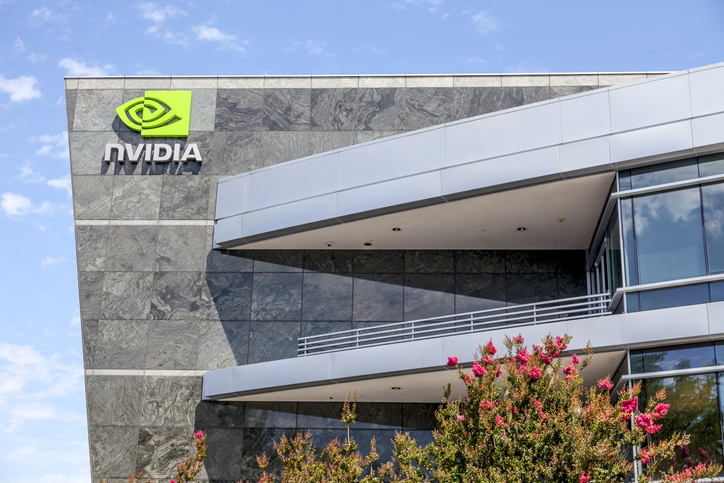The funds and trusts profiting from Nvidia’s unstoppable rise
26th May 2023 10:51
by Sam Benstead from interactive investor
The artificial intelligence boom is fuelling demand for Nvidia’s computer processing chips. Sam Benstead names the fund managers that have positioned to profit.

The hottest stock in the world right now is NVIDIA Corp (NASDAQ:NVDA), a computer chip company nearing a $1 trillion (£800 million) valuation that few people have heard of outside technology and investment circles.
The California-based company sells graphic processing units (GPUs), which are the computer chips used to process data used in artificial intelligence (AI) software, such as chat bots from the likes of OpenAI and Google, as well in gaming and cryptocurrency mining programmes.
The rise of AI is fuelling record demand for Nvidia’s processors, which are the most advanced on the market.
- Invest with ii: Top ISA Funds | FTSE Tracker Funds | Open a Stocks & Shares ISA
This week (24 May), Nvidia posted bumper results for the first three months of the year, with sales up 19% to $7.19 billion, and forecast sales of $11 billion for the three months to the end of June, more than 50% ahead of analysts' forecasts of $7.2 billion.
This sent shares surging, rising 25% on Thursday (25 May), taking them up 165% for the year and to a new all-time high. Other chip stocks also rose in value.
Big investors in Nvidia, according to data from analytics firm Morningstar, include Martin Currie US Unconstrained (8.3% in Nvidia); T.Rowe Price Global Technology (6.1%); Baillie Gifford American (5.3%); Allianz Technology Trust (5.8%); Martin Currie Global Unconstrained (6%); and Blue Whale Growth fund (9%). Polar Capital Technology Trust has 5% in Nvidia shares.
Passive funds also have big exposures to the chip company, such as Legal & General Global Technology Index Trust (5.1%) and the VanEck Semiconductor UCITS ETF (10.7%).
- Artificial intelligence: is the hype real, and how to invest in the winners
- ii view: Nvidia shares rocket amid AI fever
Scottish Mortgage has 3.2% invested in Nvidia, and 7.8% invested in ASML, which sells the machines required to make the most advanced computer chips.
Scottish Mortgage manager Tom Salter explained why he is a backer of the AI theme. He said: “Artificial Intelligence will likely transform many parts of the economy, but it would be foolhardy to make specific predictions. We can, however, say with some certainty that AI systems will require a lot of silicon.
“OpenAI has suggested that the computing power needed to run the latest models doubles every 14 weeks. Our holding Nvidia is a key supplier and enjoys formidable advantages, as the chip technology it has built over decades for computer games has proven ideally suited for AI computation.
“The semiconductor industry depends on ASML’s exceptional engineering skills to produce cutting-edge chips, and AI is just one driver of the strong demand we anticipate over the next decade.”
- What is the metaverse and should you invest in it?
- Meet the ‘new FAANGs’ the pros are getting excited about
The Sanlam Global Artificial Intelligence fund has 4.7% invested in Nvidia, and also owns AI leaders such as Alphabet (Google’s parent company) and Microsoft.
Manager Chris Ford says that Nvidia is the most important company in the AI space.
“All roads lead to Nvidia – they manufacture the computer chips that leading AI systems are developed and implemented on, and they run the operating platforms. Nvidia is still not well understood and not as broadly held by investors,” he said.
In an interview with interactive investor at the end of last year, Stephen Yiu, manager of LF Blue Whale Growth, predicted that Nvidia would be the next trillion-dollar company.
He said that share price weakness last year had not affected the demand for computer chips in areas such as autonomous vehicles and data centres, and so Nvidia had an exciting future ahead of it.
How does the chip industry work?
The semiconductor industry is tricky to get your ahead around. There are three types of companies involved in the value chain.
The first group creates the tools and machines required to build chips. Leaders include ASML, the Dutch company that makes the lithography machines used to print the circuits on computer chips. It is the largest holding in Scottish Mortgage. Other key tools are made by LAM Research and Applied Materials.
- Scottish Mortgage responds to three big concerns investors have
- Scottish Mortgage: ‘2022 was humbling – but the trust is now cheap’
Intel, Samsung, and Taiwan Semiconductor Manufacturing (NYSE:TSM) then build the chips in large factories, known as fabs, with TSM making the most advanced chips, out of Taiwan. Intel and Samsung are known as integrated device manufacturers and design, build and assemble chips in house.
Some firms only design and sell chips, and rely on manufacturers to build them. This is the group Nvidia fits in, as well as AMD and Qualcomm.
These articles are provided for information purposes only. Occasionally, an opinion about whether to buy or sell a specific investment may be provided by third parties. The content is not intended to be a personal recommendation to buy or sell any financial instrument or product, or to adopt any investment strategy as it is not provided based on an assessment of your investing knowledge and experience, your financial situation or your investment objectives. The value of your investments, and the income derived from them, may go down as well as up. You may not get back all the money that you invest. The investments referred to in this article may not be suitable for all investors, and if in doubt, an investor should seek advice from a qualified investment adviser.
Full performance can be found on the company or index summary page on the interactive investor website. Simply click on the company's or index name highlighted in the article.